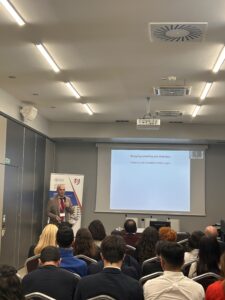CoEHAR members has sent a letter to the Spanish Ministry of Health regarding the recent proposal to amend the anti-smoking law. This amendment could lead the Spanish government to restrict the sale of products deemed effective for smoking harm reduction to tobacco shops only, thereby eliminating the opportunities offered by purchasing these products from authorized retailers such as vape shops.
To this end, with a deadline of August 15, the Spanish Ministry of Health has initiated a public consultation aimed at gathering opinions, testimonies, and scientific data from all stakeholders involved in the harm reduction process.
Despite progress in anti-smoking measures, the smoking rate in Spain remains high.
CoEHAR appreciates the government’s intent to strengthen anti-smoking policies but believes it is necessary to integrate traditional prevention and cessation approaches with new harm reduction strategies for smokers who are unable to quit.
The letter, signed by CoEHAR leaders, founder Prof. Riccardo Polosa and director Prof. Giovanni Li Volti, highlights that non-combustible products, such as electronic cigarettes and heated tobacco products, are significantly less harmful than conventional cigarettes. They can help smokers reduce the risks associated with smoking and the consequences related to smoking-related diseases.
CoEHAR suggests considering these differences in harm profiles in regulations, promoting smoke-free spaces, and ensuring access to accurate and clear information for adult smokers.
Additionally, CoEHAR leaders recommend that the Spanish anti-smoking law should not limit adult smokers’ access to harm reduction products and should promote public education on the relative risks of different nicotine-based products.
Harm reduction is a public health strategy aimed at minimizing the negative consequences of risky behaviors. In Spain, as in other countries worldwide, it is necessary to integrate existing tobacco control policies with new approaches, particularly for smokers who do not intend to quit or cannot do so on their own.
The World Health Organization (WHO) recognizes harm reduction as an integral part of a comprehensive approach but does so only by eliminating or reducing consumption. Regarding tobacco use itself, the FCTC program is based on abstinence.
Since its founding, CoEHAR has published over 150 peer-reviewed articles investigating the toxicological effects of non-combustible products, their effectiveness and tolerability among smokers, as well as their impact on health conditions among individuals with chronic obstructive pulmonary disease who have switched to these products.
What has been discovered is that non-combustible products:
- Help smokers quit smoking;
- Offer a significant reduction in exposure risk compared to conventional cigarettes;
- Are associated with clinically relevant improvements in users with smoking-related diseases.
Based on the scientific evidence gathered so far, CoEHAR offers three points and recommendations on the proposed amendments to the Spanish law:
- Promotion of smoke-free spaces: “We understand the intent to protect public health by equating vaping with tobacco use in public places, but it is important to recognize the substantial differences in harm profiles between combustible tobacco and vaping products. Equating these products could discourage smokers from switching to safer alternatives, thus undermining harm reduction efforts. We support regulations that consider the reduced risks associated with vaping and support its role in harm reduction.“
- Advertising, Promotion, and Sponsorship: “We recognize the need for regulations on advertising, promotion, and sponsorship to prevent uptake among young people. The growing popularity of vaping among young non-smokers is a legitimate concern, but regulations should not be so restrictive as to limit adult smokers’ access to accurate information about less harmful alternatives. Social media and product reviews are valuable sources of information for smokers considering switching to vaping. Balanced regulations can ensure that, while protecting the youth, adult smokers are still able to make informed decisions based on reliable information.“
- Sale and consumption of electronic cigarettes: “Restricting the sale of electronic cigarettes to state tobacco shops could significantly limit access to these harm reduction products for adult smokers. Such a restriction could inadvertently push smokers back to traditional, more harmful tobacco products. We recommend allowing the sale of electronic cigarettes in specialized vaping stores, where staff are knowledgeable and can provide guidance on their proper use. Additionally, online sales should be permitted with stringent age verification measures to ensure that only adults can purchase these products.”
Download the letter




